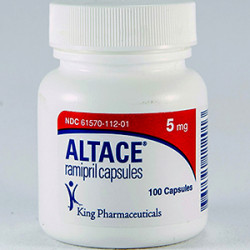Top Class Actions’s website and social media posts use affiliate links. If you make a purchase using such links, we may receive a commission, but it will not result in any additional charges to you. Please review our Affiliate Link Disclosure for more information.

Despite being an extremely rare reaction, an increasing amount of medications have been linked to this reaction. The blood pressure medication Altace has also been linked to the severe reaction.
Approved by the FDA in January 1991, Altace (generic, ramipril) is a widely-used drug prescribed to treat high blood pressure and congestive heart failure. This drug works by relaxing the muscles around the small arteries of the heart, which allows them to expand, allowing blood to flow through the heart more efficiently, ultimately reducing blood pressure.
Due to its efficiency, it has earned Altace maker Pfizer millions and remains popular despite its possible association with Stevens Johnson Syndrome, or SJS.
Stevens Johnson Syndrome is characterized by red or purple skin lesions that appear on the skin, and then later causes the skin to detach in those areas. These skin lesions can take up to 30 percent of the skin’s surface area, and can quickly spread to the eyes, mouth and throat that can obstruct the airways and make eating difficult.
Its more severe cousin, Toxic Epidermal Necrolysis (TEN), has the same symptoms but is much quicker in progression, and can affect up to 90 percent of the skin surface area. Due to the nature of these alleged Altace side effects, patients are often treated in the burn units of hospitals.
While Stevens Johnson Syndrome is not officially stated on Altace’s safety label, it does warn against certain allergic reactions like a rash or swelling on the face, tongue, or throat — symptoms of Stevens Johnson Syndrome. However, experts say that further research is needed.
Injury reports and recent health surveys from patients suggest that Altace does cause SJS and that Pfizer should update the drug’s label immediately.
According to a report on eHealthMe.com, 17,176 patients who were prescribed Altace had chimed in, describing their experience with taking Altace. The results were consolidated and reviewed on April 30, with 16,861 patients reporting side effects from taking Altace, with 50 patients (.30 percent) reporting Stevens Johnson Syndrome.
Even with the results being so small, experts state that worry should be warranted even if there is one report of Stevens Johnson Syndrome. It is important to note that Stevens Johnson Syndrome is also one of the rarest reactions that a patient can have from a medication, with only 300 diagnosed cases per year in the United States. This means that it is highly unlikely that a patient will experience it.
However, this also means that many doctors have also not encountered it much and if one of their patients reports having symptoms or skin rashes, the physician could misdiagnose the reaction.
Experienced physicians warn that Stevens Johnson Syndrome typically begins with flu-like symptoms, which will occur within the first two to eight weeks of starting the medication. It more commonly occurs in adults than children and is more common in patients with a history of drug sensitivity.
Stevens Johnson Syndrome can have fatal results if not treated properly, but some claim that if SJS is explicitly stated on warning labels, then the injury could possibly have been avoided all together. Many patients have filed SJS lawsuits against pharmaceutical companies after suffering SJS or other severe side effects, which were not mentioned on the medication’s label.
Do YOU have a legal claim? Fill out the form on this page now for a free, immediate, and confidential case evaluation. The Stevens Johnson Syndrome attorneys who work with Top Class Actions will contact you if you qualify to let you know if an individual lawsuit or class action lawsuit is best for you. [In general, SJS lawsuits are filed individually by each plaintiff and are not class actions.] Hurry — statutes of limitations may apply.
ATTORNEY ADVERTISING
Top Class Actions is a Proud Member of the American Bar Association
LEGAL INFORMATION IS NOT LEGAL ADVICE
Top Class Actions Legal Statement
©2008 – 2024 Top Class Actions® LLC
Various Trademarks held by their respective owners
This website is not intended for viewing or usage by European Union citizens.
Get Help – It’s Free
Help for Victims of Stevens Johnson Syndrome
If you or a loved one were diagnosed with Stevens Johnson Syndrome (SJS) or toxic epidermal necrolysis (TEN) after taking a prescribed or over-the-counter medication, you may be eligible to take legal action against the drug’s manufacturer. Filing an SJS lawsuit or class action lawsuit may help you obtain compensation for medical bills, pain and suffering, and other damages. Obtain a free and confidential review of your case by filling out the form below.
An attorney will contact you if you qualify to discuss the details of your potential case at no charge to you.
Oops! We could not locate your form.












